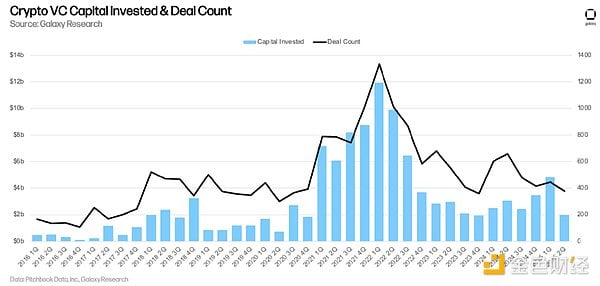Is "VC is dead" a reality or just sentiment? How do industry insiders view this downturn?
Author: Jinse Finance
Original Title: Is Crypto VC About to Disappear? What Do Industry Insiders Think?
Recently, the crypto community has sparked a discussion about whether "crypto VC has already disappeared."
According to Galaxy Research's latest venture capital report, in Q2 2025, cryptocurrency and blockchain startups raised a total of $1.97 billion across 378 deals, representing a 59% decrease in funding and a 15% decrease in deal count compared to the previous quarter. This is the second lowest quarterly total since Q4 2020.
Independent researcher Haotian pointed out: "It's been four years, and VCs still haven't found a sustainable investment model; top VCs get the best terms, the lowest prices, and earlier exit opportunities, while most small and medium VCs just follow up and get scraps, being used as exit liquidity by big institutions; most VCs are just 'large-scale retail investors,' basically betting on probability through portfolio diversity; the market is searching for a possibility that doesn't require VCs."
How do industry insiders view the demise of crypto VC? Is crypto VC really on the verge of extinction?
1. Crypto VC Suffers a Major Setback
Joint research by Chainplay and Strorible shows that among 1,181 crypto projects that received venture capital between January 1, 2023, and December 31, 2024, nearly 45% have ceased operations, and 77% have monthly revenues below $1,000.
On the venture capital side, Polychain Capital has the highest failure rate, with 44% of its invested projects terminated and 76% generating no effective revenue; Yzi Labs (formerly Binance Labs) has a project failure rate of 72%; top VC firms such as Circle, Delphi Ventures, Consensys, and Andreessen Horowitz also have a large number of supported projects that have ceased operations, with many seeing more than two-thirds of their projects fail.
Among angel investors, former Coinbase CTO Balaji Srinivasan has the highest proportion of "zombie projects" at 57%; Arthur Hayes at 34%, Santiago Santos at 15%, and projects supported by Sandeep Nailwal and Stani Kulechov each have 10% that have ceased operations.
Data shows that fundraising scale is significantly correlated with success rate. Projects raising over $50 million have a noticeably lower failure rate, while among projects raising less than $5 million, 33% have already failed and 20% have ceased operations.
2. VC Becomes More Rational
Waterdrip Capital founding partner and CEO Jademont pointed out: "Why are VCs disappearing? You can look at the listing announcements on top CEXs over the past two years; they only tell you that XXX (a few letters) is going to be listed, urging everyone to bet, but won't waste a word explaining why this project is being listed or what it does. Many retail investors have been trading against market makers for months without knowing what they're trading, let alone using the product. CEXs have become heavily gamified, and sometimes the casino even cheats.
It's said that the main criteria for CEX listings now are community hype, sufficient market-making funds, and willingness to provide enough free tokens. If these are the listing criteria, then the existence of VCs is indeed less meaningful. Most VCs can't help projects build communities, nor are they willing to help projects operate and gamble against retail investors.
So rather than saying VCs are disappearing, it's more accurate to say VCs are making different choices. First, they are unwilling to promote anymore, because promotion is mostly just PR with little practical effect. If a project fails, the community will blame them together; early-stage projects have a high probability of failure even with responsible teams. It's better to wait until the project grows before telling the market, 'I invested in this.' Second, many projects have no plans to issue tokens or do not target retail investors, so promotion is unnecessary. Just celebrate when the project goes public. Looking at the schedule, at least 3-5 early investments will be listed on Nasdaq next year. Now, entrepreneurship is no longer limited to token issuance as the only exit path."
Bullish Capital Management director Sylvia To stated: Crypto venture capitalists are lowering their risk appetite, avoiding monthly hot topics, and taking a more critical view of investments. "You really have to start thinking, this industry is building all this infrastructure, but who is using it? Is there enough trading volume? Is the trading volume generated by these blockchains enough to justify all the funds raised?"
In 2025, many projects are raising funds at excessively high and often unreasonable valuations, heavily relying on future cash flow projections.
3. Changes in Capital Flows
The long-term correlation between bitcoin prices and VC has disappeared and is "difficult to restore." This disconnect stems from waning interest among venture capitalists and a market increasingly focused on bitcoin accumulation rather than other investments.

According to Insights4VC data: capital flows have shifted. Digital asset financial companies (mainly raising funds to buy cryptocurrency tools) have attracted most of the investment this year, with $15 billion raised as of August 21 for increasing holdings of bitcoin, ethereum, and other tokens.
The divergence between large crypto holders and startups seeking venture capital reflects a change in investor mentality. Bitwise CEO Hunter Horsley stated that more and more supporters are demanding clearer paths to profitability and sustainable business models. The pursuit of returns is driving Wall Street's investment in ethereum. "If you take $1 billion in ETH, put it into a company, and stake it, suddenly, you start making a profit. Investors have become accustomed to companies that can generate profits."
1confirmation founder Nick Tomaino once posted on X that the rise of ethereum means "the death of crypto VC," with 99% of crypto VCs soon to disappear. The only way to achieve long-term development is to be in the right place at the right time, obtain institutional capital, and align with users, rather than relying on vision or creativity.
4. Market Maturity
Ajna Capital CIO Eva Oberholzer: Venture capital firms have become more selective about the crypto projects they invest in, indicating a shift due to market maturity compared to the previous cycle. "We have reached a different stage of cryptocurrency, similar to every cycle we have seen in other technologies in the past."
Market maturity has slowed the pace of pre-seed investments as VCs shift their attention to mature projects with clear business models. "It's more about predictable revenue models, institutional reliance, and irreversible adoption. So what we're seeing now is that cryptocurrencies are no longer driven by any meme coin frenzy or other trends, but more by institutional adoption. Currently, VCs are focusing on stablecoin projects and investing in other forms of payment infrastructure that can generate fees."
The shift in venture capital activity reflects the broader trend of institutional crypto investment and a focus on revenue-generating digital asset businesses, rather than the price speculation that drove investment in previous crypto cycles such as the 2021 bull market.
5. The Future of VC
Trader Tongjun Jun pointed out: "In the last bull market, VCs were dream factories, telling stories, inflating valuations, and selling to the secondary market. This time, they found themselves being cut by market makers and traffic. The so-called investment logic has collapsed, which is actually a loss of discourse power. Now, VCs no longer invest in projects; some have become market makers, some do incubation, and more are learning from investment banks, surviving on liquidity and commissions."
Quantitative trader Ares pointed out: In traditional industries, the role of VC is simply to provide funding and resource support, which is especially effective in environments where financing is difficult and IPO requirements are strict. But in the crypto world, the environment is very different, with vastly different financing difficulties and exchange listing requirements. So VCs must adapt accordingly to fit the crypto investment and financing environment. I think in the future, crypto VCs will be divided into two main categories: top exchange VCs—being invested in basically means being queued for listing; and VCs with huge traffic—such as a16z, who understand crypto, excel at marketing, and can provide one-stop services for projects.
According to Galaxy's research report: In Q2 2025, the mining category attracted the largest amount of funding (over $300 million)—the first time in recent years that mining has taken the largest share. At the same time, exchanges, lending, Web3, NFT, gaming, DAO, metaverse, infrastructure, and other categories still account for a large number of investment projects. Overall, VC activity remains active and healthy, with artificial intelligence, blockchain infrastructure, and trading continuing to attract deals and funding, and pre-seed financing activity remaining stable.
Conclusion
As the saying goes, "thirty years east of the river, thirty years west of the river," the crypto VCs that drove the last bull market cycle have cooled off in this cycle. VC rationalization, changes in capital flows, and crypto market maturity... Regardless of which view market participants agree with, perhaps the era of VCs making easy money is truly gone. What VCs should do is not clarify "whether they are still alive," but prove with real actions that "I am living better."
Disclaimer: The content of this article solely reflects the author's opinion and does not represent the platform in any capacity. This article is not intended to serve as a reference for making investment decisions.
You may also like
Gain Insight into Cryptocurrency’s Promising Future for 2026
In Brief The next major crypto bull cycle will start in early 2026. Institutional investors and regulation drive long-term market confidence. Short-term shifts show investors favoring stablecoins amid volatility.

Stunning $204 Million USDT Transfer Ignites Market Speculation

